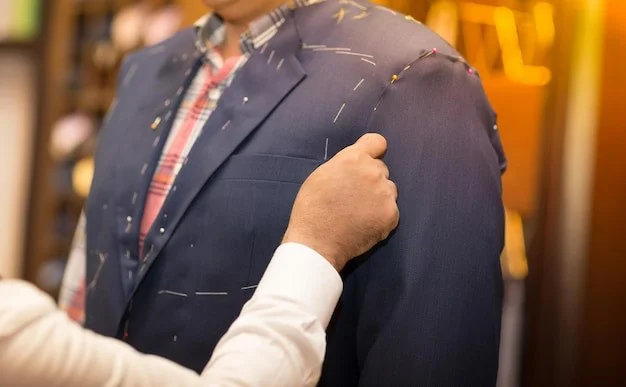
There has been a significant increase in the custom clothing market over the past few years. This is due to people’s preference for niche fashion that is personalized. It offers customization, quality as well as being exclusive which makes it different from mass production. The market focuses on those who are looking for unique, properly fitting, and high-quality clothes customized according to their own wishes. Demand for bespoke clothing keeps surging up even as individualism and sustainable fashion trends gain traction.
Currently, the bespoke clothing industry stands at some billions of dollars and is growing immensely fast. According to industry sources, this market may grow at a CAGR of approximately 7% over the next five years. Several factors contribute to this growth including increased knowledge about why custom-made clothes are more beneficial than other types in addition to technological improvements in tailoring and rising concern about sustainability among consumers.
The urban areas and trend-setting cities have led to the noticeable expansion of the bespoke clothing market making customers realize more income levels with the majority having a taste of personalization in their dressing patterns especially suits but not limited to casual wear, sportswear, and accessories hence could be described as versatile or diverse.
Several key drivers are propelling the growth of the bespoke clothing market:
Customers nowadays have an increasing desire for unique and personalized clothing that defines their individuality and fits them perfectly. This customization demand is not just limited to fit. It also includes fabric, design details such as embroidery or buttons, monogrammed initials, and custom-made linings.
Among the innovations in technology are 3D body scanning, digital tailoring and AI-driven design that have made bespoke clothing more affordable and accessible. They enable exact measurements, improved production procedures and virtual fitting rooms thus enhancing customer experience.
Consumers are turning to high-quality customized items that last longer rather than mass-produced fast fashion thanks to sustainable fashion. In addition, bespoke clothes focus on craftsmanship and durability which align with consumer preferences for eco-friendly fashion trends.
The rise of online platforms means people can easily access bespoke clothing services from the comfort of their homes. Online bespoke clothiers offer virtual consultations, digital designing tools and doorstep deliveries thereby making this once-elitist service reachable by a wider market.
Bespoke clothing is all about customization. Off-the-rack solutions no longer work for consumers who are willing to pay extra money for a dress that has been tailor-made to size alone.
The trend is most intense among younger generations like millennials and Generation Z who love standing out from the crowd through what they wear. This enables young individuals to create truly one-of-a-kind pieces that would otherwise be impossible by selecting every single detail of their garment – right from the fabric used to its precise style.
Another factor driving customization demand is the rising popularity of social media networks and influencer culture. Fashion influencers or celebrities often showcase their customized outfits on platforms like Instagram or TikTok leading other users into looking for equally tailored looks in fashion stores all over town. That’s why Gen Z loves following different celebrities and hence supporting tailor-shop businesses.
A number of things influence the buying behavior of consumers of bespoke clothing. They include:
Quality over Quantity: When it comes to bespoke clothing, people would rather have a handful of high-quality garments than many low-quality items. These are seen as valuable long-term investments due to their craftsmanship, attention to detail and fit.
Brand Loyalty: Once they find a brand that satisfies their customization needs today’s customers will most likely repeat purchases with this brand in the future. In order to promote loyalty among customers in this industry, the brands must offer personalized support, excellent quality and consistent delivery.
The bespoke clothing market is a varied and vibrant mix of different players who address various needs and tastes. Heritage tailors and boutique ateliers represent the history of this sector whose bespoke offerings are based on traditional skills and have personal customer interaction as a mark.
These businesses are generally family-owned, with many generations of experience in making bespoke clothes that are equally works of art and comfort.
On the other hand, modern e-commerce platforms have emerged as significant actors operating within the bespoke clothing market by utilizing technology to make bespoke services more accessible to many. Kutetailor is one of the most impressive examples. This bespoke clothing manufacturer combines both online and offline shops, providing seamless and convenient services to clients.
The market of bespoke clothing can be classified into several categories founded on the following factors.
Demographics: When it comes to consumer preferences and expenditure, age groupings, gender as well as income levels play very vital roles. For instance, younger customers may concentrate more on customizability and trendiness whereas older ones may go after classic styles and superb artistry.
Geography: The demand for bespoke clothing varies by place with urban areas and other trendy cities experiencing high demand. Similarly, cultural differences affect fashion trends leading to varying preferences among the consumers resulting in regionally popular types of bespoke clothing that are specific to regions.
Product type: This encompasses a variety of things ranging from casuals to suits, dresses sportswear, or even accessories. Each product type serves different needs that vary according to different occasions which further separates this market into smaller segments.
Managing a complex supply chain is one of the most difficult tasks in the bespoke clothing industry. In order to succeed timely delivery of good quality materials must be ensured even then maintaining constant communication with clients must also be considered by companies.
Companies therefore should collaborate with suppliers who will ensure the availability of such resources as trims, and fabrics among others sourced from various parts of the world thus making logistics efficient, quality control processes robust, and capable of dealing with supply chain disruptions.
Maintaining quality while scaling customization is a huge problem. Due to increasing demands without letting down artistry through competition, skilled labor forces, as well as modern technologies, should be invested by companies.
It may involve the use of technology tools such as automation but what makes this market unique is the personalized attention given to every garment made by human beings. Attaining the right balance between tailoring tradition and technology is crucial for effective scaling customization.
There are both challenges and opportunities that come with the growing internationalization of bespoke clothing markets On one hand there is potential for growth in developing countries but on the other hand, it is required that cultural differences and consumer preferences be understood.
To become successful globally, companies should take into account local fashion trends, tailor products accordingly, and build brand recognition in new markets. Moreover, businesses must overcome logistical issues related to international transport as well as customs regulations and find alternative sources within a country.
The world of bespoke clothing has not been spared by recent cultural trends such as the emergence of influencer marketing and social media for example. As a result, customers are constantly looking for unique and stylish bespoke pieces based on fashion trends from celebrities and influencers.
To showcase their work, engage with potential customers, or develop loyal followings, bespoke clothing brands have a powerful tool known as social media.
Similarly, the body positivity and inclusivity movement in the fashion industry has also influenced the market for bespoke garments. This means that consumers need attire that will fit their individual body shapes leading to rising demand for custom-made clothes.
Consequently, many manufacturers are offering inclusive advertisement campaigns in more sizes as well as personalized fitting experiences in response to this trend.
Through cross-cultural influences, the shape of the market for tailored clothes can be defined. It creates unique fusion styles reflecting various cultures which appeal to people all over the world thus making designers universal brands while maintaining traditional crafts in global space through smart designs.
An example of the fusion of Western and Eastern fashion elements is the creation of new bespoke attire using traditional clothes, patterns, and sewing techniques from different nations. This combination not only gives distinctive touches to bespoke wear but also enables consumers to make a statement about themselves by choosing clothes rich in variety and culture.
The future looks bright for the market for bespoke clothing as it is expected to grow further over the next few years. There are several trends that will shape the future of this market.
Technological Advancements: Technological advancements in custom cloth production such as AI-powered design capabilities, virtual fitting rooms and advanced fabric technologies will revolutionize even more the field of bespoke clothing.
These innovations will contribute to better customization processes, ensure accurate fitting measurements and simplify manufacturing processes thus making formal tailored clothing become more accessible to a wide range of clients.
Sustainability: Emphasis on sustainability and ethical fashion will continue driving demand for bespoke apparel. Nowadays customers are increasingly demanding high-quality tailor-made items that prevent post-order wastage while promoting responsible consumption.
In addition, any tailoring firm that decides to uphold eco-friendly materials use or take part in fair trade practices through their supply chain stands a good chance to outdo others within this niche market.
Global Expansion: As disposable incomes increase and people seek personal fashion solutions, emerging markets offer great potential for growth in the bespoke clothing industry. Companies that manage cultural differences well enough can adapt their offerings to meet regional needs; hence they hold strong chances to expand abroad globally.
In conclusion, it can be said that the Bespoke Clothing Market is a dynamic and fast-evolving industry. Understanding market trends, customer behavior, and competitive landscape is vital for companies intending to prosper in this space.
Thus growing demand for tailored fashions continues boosting its development along with improvements in technology as well as sustainable trends besides e-commerce uptake rates growing higher than ever before.
However, due to issues related to scaling customization or managing its supply chain, the industry has much room for growth and development through innovation on a global scale. As companies stay ahead of events and embrace new ideas, they can develop business opportunities in bespoke clothing and add value to their customers.
1. Custom Made Clothes Market Size, Share, Growth, And Industry Analysis By Type (Coat, Skirt, Pants, Shirt, Denim, and Others) By Application (Online and Offline) Regional Forecast To 2032
2. Custom Apparel Market Analysis APAC, North America, Europe, Middle East and Africa, South America - US, China, UK, Germany, India - Size and Forecast 2024-2028
3. Global Custom Clothing (Made to Measure) Market Growth Insights By Types (Coat, Skirt, Pants, Shirt), By Applications Covered (Men, Women) & Region - Forecast to 2031